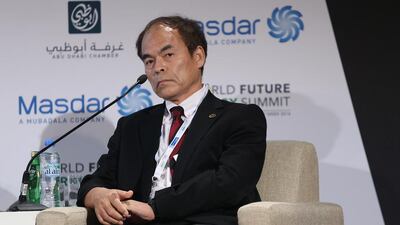Shuji Nakamura may now be known for his invention of LED bulbs, but his role in safeguarding rights of scientists cannot be overlooked.
ABU DHABI // Dr Shuji Nakamura won the Nobel Prize in Physics in 2014 for revolutionising the way we light the world, but it is his legal legacy for which the scientific community thanks him most.
The Japanese-American invented the blue LED, a device that led to the creation of highly efficient white LED bulbs, cutting energy costs the world over.
However, his past innovations sparked a fierce court battle over patent rights and remuneration for inventors.
While working for a company in the late 1990s, Dr Nakamura filed about 500 patents for his inventions, which the company wished to claim as its own.
“Before the Nobel prize, [from] 2001 to 2005 I was at University of California Santa Barbara, but then my former company asked me to sign a non-disclosure agreement – I refused,” Dr Nakamura said.
“My former company filed a lawsuit against me, using infringement of trade secrets, then I became so angry.”
Dr Nakamura filed a counter lawsuit that he eventually won, resulting in him receiving US$8 million (Dh29.38m) and changing the way Japanese companies reward patent inventions.
The ruling was hailed as a victory for scientists, who until that time would receive a fraction of the value generated by their inventions.
“Before my lawsuit, companies gave a special bonus, about $10,000 for a great invention, but after my court ruling, they changed that to $3 million,” he said.
Since then he has been a harbinger for the importance of scientific knowledge, school reform and something of a champion for the unsung heroes of the scientific community.
“All companies, the top management people, don’t like me. But scientists come up to me and thank me all the time, confidentially of course, because it has changed since I fought for them,” Dr Nakamura said.
With his development of the blue LED, Dr Nakamura helped to usher in a new era for high-efficiency lighting, and reducing energy consumption.
A US department of energy study found that LEDs installed in 2012 saved about $675m in energy costs.
You can swap an LED bulb for any regular light bulb at home.
LED bulbs are extremely energy efficient and long-lasting. An LED bulb can cut energy consumption by more than 80 per cent and lasts longer than conventional light bulbs.
He said that, now more than ever, with the importance of research in sustainable energy, the international community needed to begin supporting scientists and he felt that the UAE and GCC as a whole was taking the right approach.
“All scientists, all over the world, developed new technology, new energy resources and clean energy instead of oil, because people shouldn’t use oil for energy any more,” he said. “To improve the economy forever, they need new industries.”
Dr Nakamura said that across the world scientists needed to be recognised to foster innovation. A part of nurturing that environment would be to start with the school system.
“Education is most important. By just importing new technology, people will not be educated and won’t understand it in depth. To have a deep understanding, to invent new things, that is where education is most important,” he said.
nalwasmi@thenational.ae

